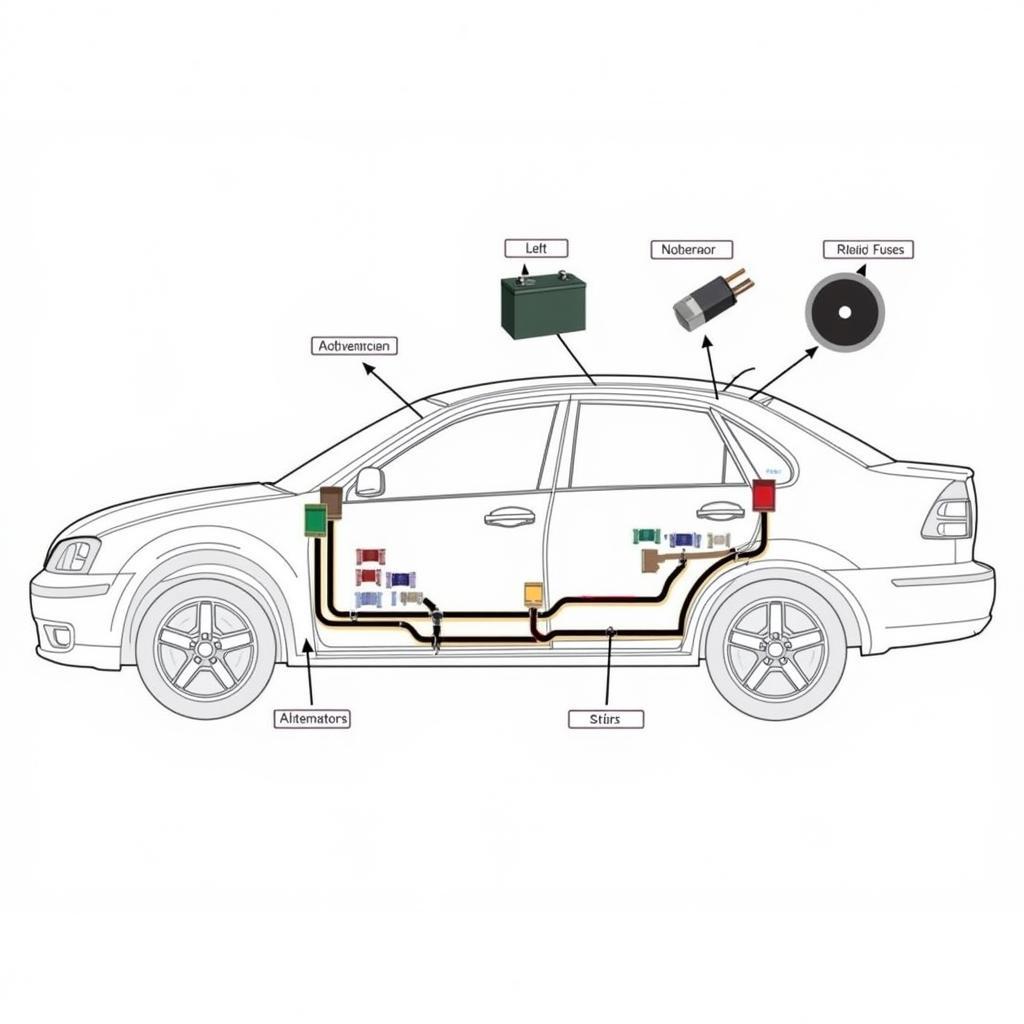Electrical repairs for cars are becoming increasingly complex with the advancement of automotive technology. From simple blown fuses to intricate computer network issues, understanding the electrical system in your vehicle is crucial for proper maintenance and timely repairs. This guide will explore various aspects of car electrical repairs, from diagnosing problems to finding qualified technicians. We’ll also cover preventative measures and discuss the rising costs associated with these increasingly sophisticated systems.
Understanding Your Car’s Electrical System
Modern vehicles rely heavily on intricate electrical systems that control everything from the engine and transmission to the entertainment system and safety features. electrical repairs on cars can range from minor issues, like a faulty headlight, to major problems, such as a malfunctioning ECU (Engine Control Unit). A basic understanding of the different components and their functions is essential for any car owner. Key components include the battery, alternator, starter, wiring harnesses, fuses, relays, and various sensors.
Common Electrical Problems in Cars
Several electrical issues can plague car owners. Some of the most common include:
- Starting problems: A dead battery, faulty starter, or ignition switch issues can prevent your car from starting.
- Dim or flickering lights: This could indicate a problem with the alternator, battery, or wiring.
- Malfunctioning power windows or locks: Often caused by faulty switches, motors, or wiring within the door panels.
- Issues with the entertainment system: Problems with the radio, speakers, or navigation system can stem from loose connections, blown fuses, or internal component failures.
- Warning lights on the dashboard: These lights can signal various problems, from minor sensor malfunctions to serious engine or transmission issues. Never ignore dashboard warning lights.
 Car Electrical System Diagram
Car Electrical System Diagram
Diagnosing Electrical Issues
Diagnosing electrical problems in cars requires specialized tools and knowledge. While some simple issues can be resolved with basic troubleshooting, more complex problems often necessitate the expertise of a qualified technician. Diagnostic tools, such as multimeters, OBD-II scanners, and oscilloscopes, can help pinpoint the source of the problem. electrical repairs to cars are often best left to professionals.
Finding a Qualified Auto Electrician
When facing complex electrical issues, finding a reputable and skilled auto electrician is paramount. Look for certifications, experience, and positive customer reviews. A qualified technician will have the necessary tools and expertise to diagnose and repair your car’s electrical system efficiently and effectively.
Preventing Electrical Problems
Preventive maintenance can help avoid costly electrical repairs. Regularly checking your battery’s health, ensuring clean and tight connections, and addressing minor issues promptly can prevent them from escalating into major problems.
The Cost of Electrical Repairs
Cost of repairs for electric cars and traditional vehicles can vary greatly depending on the complexity of the issue and the specific vehicle. Simple repairs, like replacing a blown fuse, can be relatively inexpensive. However, more complex repairs, such as replacing a faulty ECU or repairing extensive wiring damage, can be significantly more expensive.
“Electrical diagnostics are key,” says John Smith, Lead Auto Electrician at Smith Automotive. “A proper diagnosis saves time and money by pinpointing the exact issue, preventing unnecessary part replacements.”
Are Electric Cars Cheaper to Repair Electrically?
Are electric cars cheaper to repair is a common question. While electric cars have fewer moving parts than traditional gasoline-powered vehicles, specialized knowledge and equipment are required for their electrical systems. This specialized labor can sometimes lead to higher repair costs, depending on the specific issue. Electrical repairs cars long beach can find qualified technicians specializing in electric vehicle repairs.
Conclusion
Electrical repairs for cars are an inevitable part of vehicle ownership. Understanding the basics of your car’s electrical system, practicing preventative maintenance, and knowing when to seek professional help can save you time, money, and frustration. Staying informed about common electrical problems and keeping up with routine maintenance can significantly extend the life of your vehicle’s electrical system.
FAQ
-
What are the most common signs of electrical problems in cars? Starting problems, dim lights, malfunctioning power windows, and dashboard warning lights.
-
How can I prevent electrical problems in my car? Regular maintenance, including battery checks and cleaning connections, can help prevent issues.
-
How much do electrical repairs for cars cost? Costs vary depending on the problem’s complexity, from a few dollars for a fuse to hundreds or thousands for more significant issues.
-
What tools are used to diagnose electrical problems? Multimeters, OBD-II scanners, and oscilloscopes are common diagnostic tools.
-
How do I find a qualified auto electrician? Look for certifications, experience, positive reviews, and specialization in your vehicle type.
-
Are electric car repairs more expensive? While they have fewer moving parts, specialized labor can sometimes make repairs more costly.
-
What should I do if my car won’t start? Check the battery, starter, and ignition switch. If the issue persists, contact a qualified mechanic.
Need Further Assistance?
Explore related articles on our website for more in-depth information on specific car electrical issues. Have a question not covered here? Don’t hesitate to contact us!
For immediate assistance, reach us via WhatsApp: +1(641)206-8880 or Email: [email protected]. Our 24/7 customer support team is ready to help.


